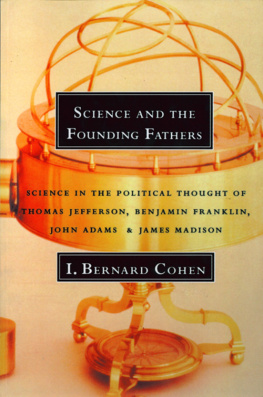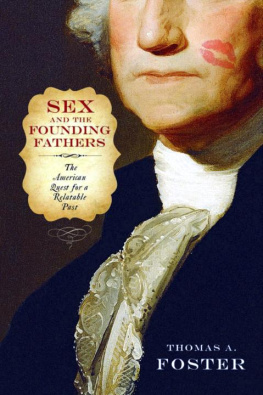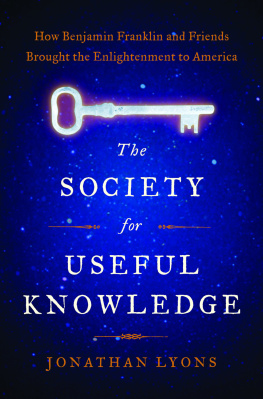ACKNOWLEDGMENTS
I am deeply grateful for the assistance of what I consider the five families of Benjamin Rushrelated research: the Library Company of Philadelphia, the Historical Society of Pennsylvania, the American Philosophical Society, the College of Physicians, and the Rosenbach Library. All are within twenty blocks of where Rush lived, and are lucky to have immensely knowledgeable, dedicated staff. I am also indebted to several Philadelphia institutions that, despite having less Rush material, have staffs that care about himand about making sure historians get things right, in particular Independence National Historical Park, the University Archives and Records Center at Penn, and the Pennsylvania Hospital Historical Collections. Thanks especially to Steve Smith at the Historical Society of Philadelphia; Charlie Griefenstein and Michael Miller at the American Philosophical Society; Karie Diethorn and Coxey Toogood at Independence National Historical Park; Jim Duffin and Mark Lloyd at the Penn Archives; Elizabeth Fuller at the Rosenbach; Stacey Peeples at Pennsylvania Hospital; Penn research librarian Holly Mengel, and independent researcher Leslie Potter.
The Library Company of Philadelphia went through a number of changes during this book, so I thank, in chronological order: John van Horn, director when this book started; Richard Newman, who during his tenure was generous enough to run seminars for me and my researchers, notably on African American churches, slavery (with visiting scholar Nicholas Wood from Yale), and mental illness care (with Newmans wife, Dr. Lisa Hermsen, a mental health historian); and most recently, Michael Barsanti, along with the rest of the devoted staff, especially James Green and Ann McShane.
Thanks to Benjamin Rushs kind descendants Lockwood Rush and Stockton Rush for allowing me to use paintings from their family collections and helping us get images (also thanks to Beth Allan, curator at Morven Museum).
It was my great fortune, in the late winter of 2013, to receive a last-minute invitation to write a paper and present at the Republics of Benjamin Rush conference at Dickinson, with the encouragement of University of Pennsylvania historian Daniel Richter and Dickinson historian Christopher Bilodeau. I was also lucky to be placed on a panel with Martha King, senior editor of the Thomas Jefferson Papers at Princeton, and William Ferraro, managing editor of the Papers of George Washington at the University of Virginia. Both have been enormously helpful, willing to answer, or at least consider, any question Ive had, no matter how ridiculous. They also connected me with their colleagues in other such projects.
The most helpful of these was the terrific Sara Georgini, the series editor of the John Adams Papers at the Massachusetts Historical Society, who was very generous with her time and internal database. (The staff at Mass Historical was also terrific.) I got energetic assistance from Jane Calvert, the director of the John Dickinson Writings Project at the University of Kentucky, and I had an illuminating talk with Ellen Cohn, the editor of the Benjamin Franklin Papers at Yale.
I was fortunate to access the contagious Rush enthusiasm of Andre Sobocinski, a historian at Navy Bureau of Medicine, who helped navigate military and Washington, D.C., sources. Mental health special collections librarian Marisa Shaari at Weill-Cornell Medical Center Oskar Diethelm Library made it possible for me to spend a lot of quality time with the Carlson papers; thanks also to the director of the History of Psychiatry branch Dr. George Makari.
At crucial points in the research for this book, I was led in the right direction by wonderful medical historians, including Charles Rosenberg, Andrew Scull, and Nancy Tomes. And when I first started exploring the mental health of Rushs son, Johnas well as that of Dr. Rush himselfI was fortunate to have the advice of the former chair of Penns psychiatry department, Dr. Peter Whybrow, now the director of the Semel Institute for Neuroscience and Human Behavior at UCLA, who encouraged my interest in exploring Rushs most frenzied and dark periods as possible indicators of his own manic-depressive illness. He also informed my ideas about where bloodletting might fit into the history of psychiatric care, as a crude early method of breaking psychosis. (I met Peter through my friendship with Dr. Kay Redfield Jamison who, along with her late husband, Dr. Richard Wyatt, taught me so much about the medicine and politics of mental health, and how to narrate diseases of the brain.)
I have also, over the years, enjoyed impassioned discussions about Rush and the history of psychiatry with Dr. Jeffrey Lieberman, chair of the psychiatry department at Columbia and the former president of the American Psychiatric Association. I was doing some teaching in Jeffs department and some editorial consulting for him when the APA started talking about dropping Rushs face from its logo. I begged him (and others at the association) not to do it, and argued they should instead double down on the doctors mental health legacy. I failed to save Rushs faceand will treasure my old APA convention bags featuring himbut I hope this book makes mental health professionals worldwide better understand Rushs contribution, and his importance as a medical role model. There is a reason both AMA and APA give annual Benjamin Rush Awards for public service.
Ive been fortunate to get to know a lot of national figures in mental health and addiction because of the inspirational years I spent writing a book with Congressman Patrick Kennedy, who I am proud to call a friend and colleague.
A lot of Philadelphia area physicians and mental health professionals were very encouraging about this project, including Dr. Sandy Bloom and Ruth Ann Ryan (lifelong friends I made covering my first mental health story in 1984) and Joe Pyle at the Scattergood Foundation (which supports the WHYY Behavioral Health Journalism workshops I run). Our personal physician, Bradley Fenton, loaned me his copy of a first edition of Rushs Medical Inquiries and Observations, just so I could have it sitting near my desk while writing.
Thanks for so many kindnesses, personal and professional, to Jim Graham and Chris Meck at Graham Studios/Power Plant Productionsincluding Jim schlepping deep into the suburbs to photograph the Rush portrait on the cover, and taking my author photo.
I am deeply indebted to two departments at the University of Pennsylvania, which helped nurture this project in so many ways. One is the Center for Programs in Contemporary Writing, where I am a lecturer; there I am eternally grateful to Al Filreis, Julia Bloch, Mingo Reynolds, and Greg Djanikian, as well as to the staffs at CPCW and Kelly Writers House, who allowed me and several waves of independent study students to explore not only themes and characters for this book but also unique ways of researching and writing narrative history. I am also grateful to the History and Sociology of Science Department, where my colleague and friend David Barnes has helped me work with some of his very best students.
The process for researching this book began with a class of nine students who met once a week at Writers House during the 201314 academic year. They became the original Rushistas, of which there have been many since, and I wish I had taped their conversations because they were hilarious and always challenging; they also wrote some really smart papers. The original group included Brenda Wang, David Poplar, Alina Grabowski, Naomi Shavin, Katelyn Behrman, Zoe Kirsch, DJ Wendler, and Debbie Chiang, and they were led by Amanda Mauriwho became my de facto teaching assistant, and then my full-time researcher after graduating, overseeing the early research on this project. I then started working with smaller student groups, including Lily Young (who did great research on the Macpherson case), Laine Higgins, Casey Quackenbush, Aaron Mandelbaum, Mel Bavaria, and Rive Cadwalader.








